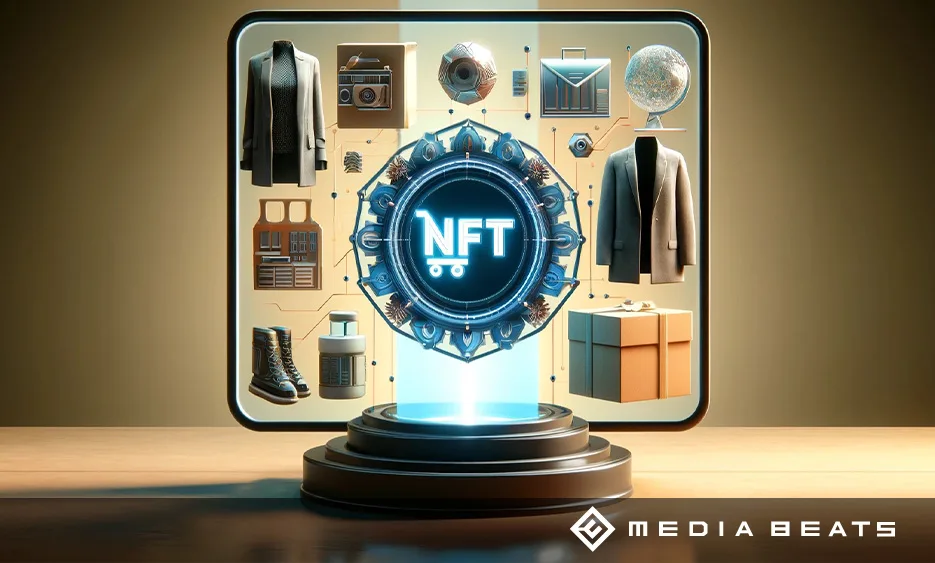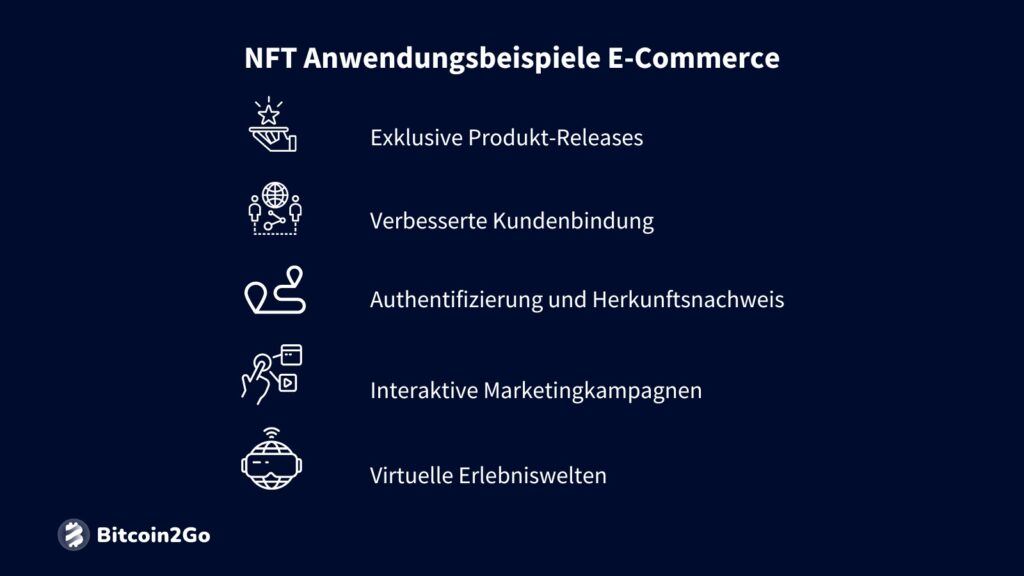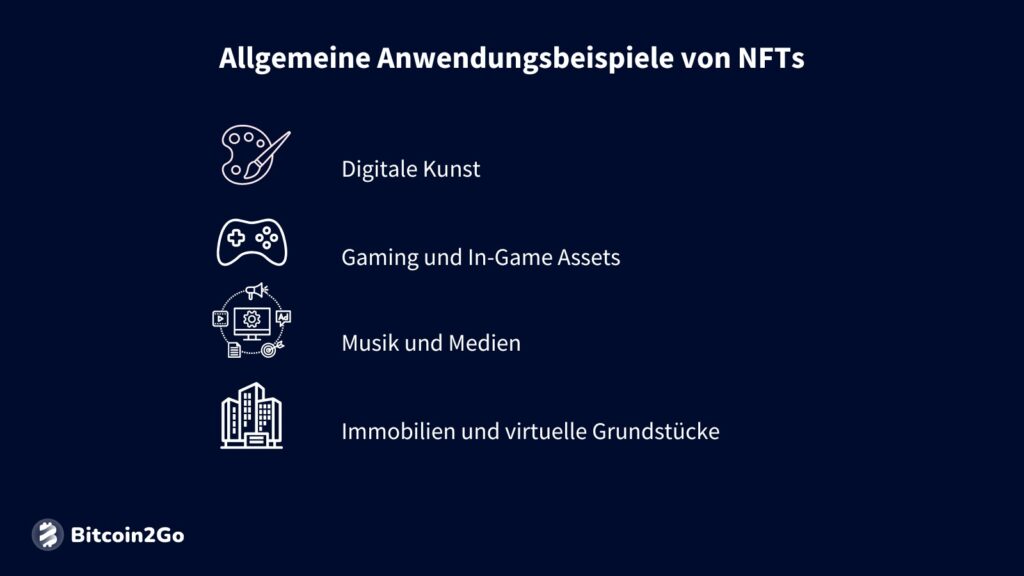
NFTs in E-Commerce: A Guide
NFTs (Non-Fungible Tokens) have increasingly come into focus in recent years. They not only offer new opportunities in the art world but are also gaining more significance in e-commerce. This technology enables companies to offer innovative products, strengthen customer loyalty, and tap into new revenue streams.
In this guide, we look at the role of NFTs in e-commerce and highlight other areas of application to provide a comprehensive picture of this versatile technology.
What are NFTs?
NFTs are unique digital assets stored on the blockchain. Unlike traditional cryptocurrencies, they cannot be exchanged with one another because each token possesses individual characteristics.
“The uniqueness makes NFTs particularly valuable, as they can clearly assign digital and physical goods to a specific owner. These characteristics make NFTs interesting not only for the art market but also for e-commerce,” says Mirco Recksiek, co-founder and expert at Bitcoin2Go.
A key advantageof NFTs lies in their ability to clearly define rights and ownership. Through blockchain technology, NFTs verify both the ownership and the provenance of a digital or physical asset. This allows artists and companies to protect their rightsprotect their rights and monetize their products.
NFTs also create new pathways for a sustainable creative economy by enabling artists and companies to securely market and license their digital content. The transparency of the blockchain ensures tamper resistance, which offers significant added value, especially in industries such as art, music, and digital commerce.
NFTs in e-commerce: opportunities and potential
The potential applications of NFTs in e-commerce are diverse and offer numerous opportunitiesto stand out from the competition. From customer loyalty and product development to exclusive offers in digital marketing, many innovative approaches are emerging.

Exclusive product releases and editions
NFTs offer companies the opportunity to sell exclusiveand limited digital products. This can increase customer interest and excitement, as they feel they are acquiring something unique and scarce. Limited editions of digital goods or special versions of physical products, certified through NFTs, can become a valuable sales tool.
Customer loyalty through digital collectibles
Innovative companies are exploring the wide range of NFT applications and their versatile use cases. They utilize NFTs both for exclusive customer experiences and to tap into new revenue streams. Additionally, they integrate NFTs into loyalty programs, rewarding customers with digital collectibles.
Authentication and proof of origin
Especially with high-end or limited products, authentication plays a crucial role. NFTs offer a tamper-proof way to verify the origin and authenticity of a product. This is particularly relevant for companies in the luxury segment that want to protect their customers from counterfeits.
Interactive marketing campaigns
Companies can also use NFTs for interactive marketing campaigns. For instance, NFTs could be offered as rewards in sweepstakes or as part of a virtual experience that deepens customer engagement with the brand. This form of customer interaction offers innovative ways to strengthen brand awareness.
Virtual worlds of experience and metaverse
With the development of the Metaverse, companies are discovering additional opportunities to strengthen their brand through NFTs. Brands can create virtual worlds where customers gain exclusive experiences and access to special areas by owning certain NFTs. This could range from virtual showrooms to interactive experiences, where NFTs serve as entry tickets.
General application examples for NFTs
In addition to e-commerce, there are numerous other areas in which NFTs are used. These examples illustrate the versatility of this still new technology.

Digital art
The art market has discovered NFTs as a new medium for selling and trading digital artworks, allowing artists to sell their works as NFTs while ensuring the authenticity and uniqueness of their creations. The most famous example of this is the sale of a digital artwork by Beeple for $69 million. NFTs not only provide artists with a new source of income but also enable collectors to acquire unique digital art.
Gaming and in-game assets
In the gaming sector, NFTs have introduced a new form of digital ownership. Players can acquire and trade unique in-game items, such as rare weapons or collectibles, as NFTs. These items can be used and traded across platforms, adding even more value to the gaming experience.
Music and media
In the music and media industries, artists and producers are increasingly turning to NFTs. Musicians can sell limited editions of their songs as NFTs or offer their fans exclusive rights to certain content. This direct connection between artists and fans creates new revenue streams and strengthens fan engagement.
Real estate and virtual properties
NFTs also play a role in the real estate sector, especially in virtual worlds like the Metaverse, where users can buy and sell digital land. In the real world, NFTs could be used in the future to manage proof of ownership for properties or securely represent contracts on the blockchain.
Future prospects for NFTs in e-commerce
The integration of NFTs in e-commerce is still in its early stages, but the future looks promising. Brands could increasingly use NFTs to offer their customers unique and personalized products, thereby strengthening brand loyalty.
With the ongoing development of technologies like the Metaverse, NFTs could play a central role in virtual interactions between companies and their customers. The ability to offer exclusive digital experiences and products will further expand the potential of NFTs in commerce.
Challenges and points of criticism
Despite all the opportunities, as with any new technology, there are also challenges associated with NFTs:
- Environmental impact:
Many blockchains that host NFTs have a high energy consumption, which has led to frequent criticism. However, some projects are already working on more sustainable solutions to reduce energy usage.
- Legal uncertainties:
Since the regulation of NFTs is still in its infancy, there are uncertainties regarding what rights an NFT owner actually acquires. This particularly concerns copyright and usage rights.
- Market saturation:
Due to the hype around NFTs, there is now a flood of new projects, which can lead to the overvaluation of some NFTs. Companies should therefore be cautious, aiming not only to benefit from short-term enthusiasm but also to develop long-term strategies.
Conclusion on the topic of NFTs
NFTs offer companies in e-commerce an exciting opportunity to provide exclusive products, thereby strengthening customer loyalty while also implementing innovative marketing strategies. Furthermore, their versatility makes them valuable not only in commerce but also in fields such as art, gaming, and real estate. Companies that adopt NFTs early have the chance to establish themselves as pioneers in a growing market.
